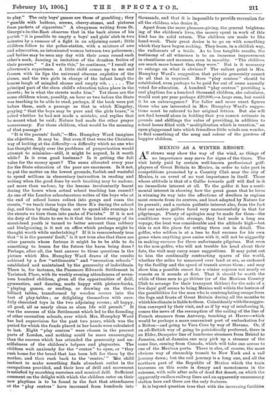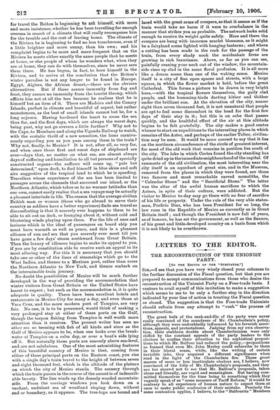MEXICO AS A WINTER RESORT. '
ASstraws may show the way of the wind, so things of no importance may serve for signs of the times. The visit lately paid by certain well-known professional golf- players of Great Britain to Mexico, in order to take part in competitions promoted by a Country Club near the city of Mexico, is an event of no vast importance in itself. Those whose attitude is that of a Gallio towards golf will find in it no immediate interest at all. To the golfer it has a senti- mental interest in shOwing how the great game that he loves is winning its way into the affections of dwellers in regions most remote from its centres, and least adapted by Nature for its pursuit; and a certain pathetic interest also, from the fact that our native golfers fared very unsuccessfully in that fai pilgrimage. Plenty of apologies may be made for them—the conditions were quite strange, they had made a long sea voyage, the heat was considerable and the altitude high—but this is not the place for setting them out in detail. The golfer, who seldom is at a loss to find excuses for his own game when anything goes amiss with it, will not be niggardly in making excuses for these unfortunate pilgrims. But even to the non-golfer, who will not trouble his head about their fate, the visit may carry some suggestions. It may point out to him the continually contracting spaces of the world, whether the miles be measured over land or sea, as reckoned by the facility and the speed of transit across them ; and may show him a possible resort for a winter sojourn not nearly so remote as it sounds at first. That it should be worth the while of these men to go thither (or of the Mexican Country Club to arrange for their transport thither) for the sake of a few days' golf seems to bring Mexico well within the horizon of the possibilities for the man who is contemplating escape from the fogs and frosts of Great Britain during all the months to which his climate is liable to them. Coincidently with the sugges- tion conveyed by their visit, and as if by way of reinforcing it, comes the news of the resumption of the sailing of the line of French steamers from Antwerp, touching at Havre—which would be perhaps a more convenient port of embarkation for a Briton—and going to Vera Cruz by way of Havana. Or, if an all-British way of going be patriotically preferred, there is an Elder, Dempster line of handsome steamers from Bristol to Jamaica, and at Jamaica one may pick up a steamer of the same line, coming from Canada, which will take one across to one of the Mexican ports, There is also, of course, the more obvious way of steamship transit to New York and a rail journey down ; but the rail journey is a long one, and all the northern part of the Republic of Mexico which the train traverses on this route is dreary and monotonous in the extreme, with mile after mile of dead fiat desert, on which the apparently endless railway lines and an apparently unnecessary station here and there are the only features.
It is beyond question true that with the increasing facilities
for travel the Briton is beginning to ask himself, with more and more insistence, whether he has been travellinglar enough
oversea in search of a climate that will really recompense him for the trouble and the cost of leaving home. The climate of the Riviera he is beginning to find no less treacherous, even if a little brighter and more sunny, than his own; and his complaint begins to be more and more frequent that on the Riviera he meets either exactly the same people that he meets at home, or else people of whom he wonders what, when they are at home, they can do with themselves, since he never sees them there. He has begun, in fact, to bore himself in the Riviera, and to arrive at the conclusion that the Briton's . winter paradise is not any longer to be found in Europe. Egypt, Algiers, the African desert,—these are the obvious alternatives. But if these assure immunity from fog and frost, they assure no immunity from the tourist throng, which afflicts him not at all the less because he realises that he is himself but an item of it. There are Madeira and the Canary _Islands, perfect in climate and beautiful of aspect, but rather monotonous, as the best of small islands cannot but be, for a long sojourn. Having hardened the heart to cross the sea thus far, and the first days, which are always the worst days, being past, why not go oversea a little further? Why not to the Cape, to Mombasa and along the Uganda Railway to watch, with the ecstatic thrill of a new sensation, the lions carnivo- rously regarding you as you pass among them in the train ? Why not, finally, to Mexico ? It is not, after all, so very far, and when• once those first and worst days of shipboard are over—days that, no matter on what sea, are almost always ,days of suffering and humiliation to all but persons of specially constructed organs—the sufferer will come up, " pale but determined," upon deck, to find himself in blue skies and soft airs suggestive of the tropical land to which he is speeding. Travellers whose experience of the sea has been limited to passages across the channels that surround our island, or the Northern Atlantic, which takes us to no warmer latitudes than our own, cannot easily realise that a sea voyage may be actually a pleasant interlude in life. The reason that the average civilian British man or woman (those who go abroad to serve their country as soldiers have a better experience) finds sea travel so discomforting is that it scarcely ever happens to them to be able to sit out on deck, or lounging about it, without cold and blustering winds playing upon them. For the life of ease and laziness which is the ideal of passengers on board ship you must have warmth as well as peace, and this is a pleasant alliance of sun and sea that you scarcely ever meet till you have gone a few days' steam southward from Great Britain. Then the luxury of idleness begins to make its appeal to you, if you are by constitution able to receive such an appeal in its most alluring way. For this it is necessary that you should take one or other of the lines of steamships which go to the West Indies, and thence to a Mexican port, rather than cross the Northern Atlantic to New York, and thence embark on the interminable train journey.
No doubt the possibilities of Mexico will be much. further developed in the way of providing the accommodation that winter visitors from Great Britain or the United States have learnt to expect ; but such as the accommodation is, it is quite adequate in quality. There have been excellent hotels and restaurants in Mexico City for many a day, and even those at Vera Cruz, and the more modern port of Tampico, are very fair. No one, it is to be presumed, would think of making a very prolonged stay at either of these ports on the Gulf, though the tarpon fishing from Tampico is well worth more attention than it receives. The present writer has seen no other sea so teeming with fish of all kinds and sizes as the Gulf of Mexico appears to be, when one looks over the break- water at Tampico on a calm day, or over a boat's side lying Off it. But naturally these ports are scarcely above sea-level, and are not salubrious. One of the most astonishing features of this beautiful country of Mexico is that, coming from either of these principal ports on the Eastern coast, you rise with a single day's train travel to the height of between seven and eight thousand feet, which is the altitude of the plateau on which the city of Mexico stands. The scenery through which the train passes in the course of the ascent is of indescrib- able beauty. The line winds up the densely wooded mountain- side. From the carriage windows you look down on a verdant, undulant sea of woodland sloping down, without end or boundary, as it appears. The tree-tops are bound and
laced with the great arms of creepers, so that it seems as if the train would take no harm if it were to overbalance in the manner that strikes you as probable. The network looks solid enough to receive its weight quite safely. Here and there the creepers are hung with immense scarlet blossoms, as it might be a fairyland scene lighted with hanging lanterns ; and where a cutting has been made in the rock for the passage of the train, from every shady nook the maidenhair ferns are growing in rich luxuriance. Above, as far as you can see, painfully craning your neck out of the window, the mountain- side rises up clad in the same floral profusion. It is all more like a dream scene than one of the waking sense. Mexico itself is a city of fine open spaces and streets, with a large square, in which the flower market is held, before the great Cathedral. This forms a picture to be drawn in very bright hues,—with the tropical flowers themselves, the gaily clad people, and the bumming-birds darting hither and thither under the brilliant sun. At the elevation of the city, nearer eight than seven thousand feet, it is not unnatural that people are apt to feel some discomfort in the head for the first few days of their stay in it ; but this is an ache that passes quickly, and the healthful effect of the air at this altitude begins to be felt gratefully. The city makes a good centre whence to start on expeditions to the interesting places in which remains of the Aztec, and perhaps of the earlier Toltec, civilisa- tion may be seen. It would be more correct to say that it lies on the northern circumference of the circle of greatest interest, for most of the old work that remains in position lies south of the city. The lake in which Cortes found the city standing has quite dried up in the immediate neighbourhood of the capital. Of remnants of the old civilisation, the most interesting near the city itself is an aqueduct of great size, and in the Museum, removed from the places in which they were found, are those two famous and most remarkable carved monoliths, the " Calendar Stone" and the " Sacrificial Stone." The latter was the altar of the awful human sacrifices to which the Aztecs, in spite of their culture, were addicted. But the visitor to Mexico to-day may go there with no fear of sacrifice of his life or property. Under the rule of the very able states- man, Porfirio Diaz, who has been President for so long, the law runs in the Republic of Mexico as currently as in Great Britain itself ; and though the President is now full of years, as of honour, he has set the government, as well as the finance, of his great and little-developed country on a basis from which it is not likely to be overthrown.











































 Previous page
Previous page